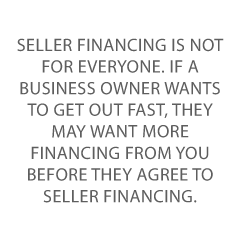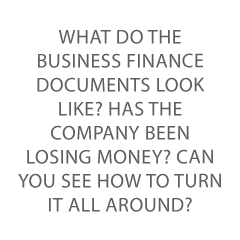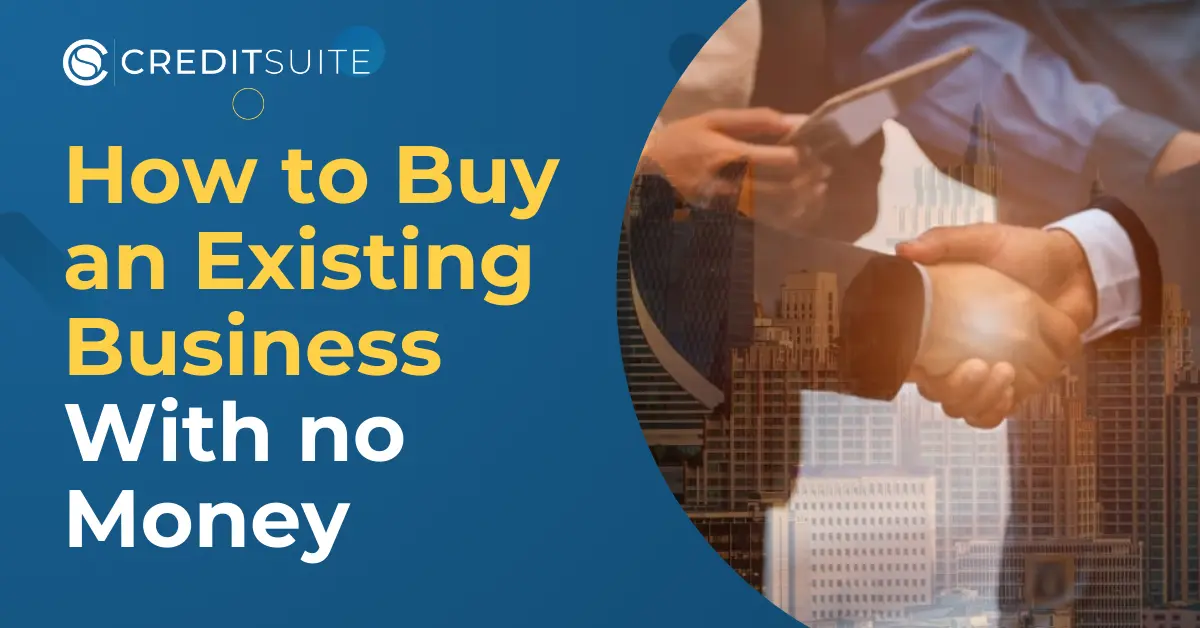Are you interested in learning how to buy an existing business with no money? The truth is, you’ll have to pay something or other. So the question is perhaps better phrased as: how can you buy an existing business with no money down?
Because it is very possible to purchase a business with no upfront investment.
This blog post may contain affiliate links, meaning when you click the links for some products and make a purchase, Credit Suite receives a commission at no additional cost to you.
Can I Buy a Business With no Money?
Absolutely! But usually this is more along the lines of no money down, versus no money at all—unless you can successfully crowdfund 100% of the purchase price. But that is not a sure thing, and we do not include it as an option as it’s tricky to do.
But not impossible.
Attack the problem from both ends—that is, find out how much you’re able to finance and not use as a down payment, and go for a less expensive option for buying an existing business, so there is less to finance in the first place.
Underperforming businesses, particularly where the ownership is burnt out or has just inherited a white elephant that they want to unload should be your first consideration.
Check with lenders on how much you can qualify for. If you have good personal credit, a bank or credit union loan, or a loan from the Small Business Administration, are all possible choices. If your consumer credit could be better, then consider an online lender.
Or consider your family and friends and work with them as angel investors. They will own part of the business (and can share in its decisions, profits, and losses)—but you can buy them out later if things are going well.
Options to Buy an Existing Business Without Capital
Option #1 – Go After an Underperforming Business
Failing businesses will generally go for less money, and owners may want to sell quickly anyway. The owner could just not be seeing a way out of a bind, or may not be aware of how certain upgrades or modernization could turn things around.
Or, the owner may simply be burned out or close enough to retirement that a full turnaround seems daunting if not outright impossible.
If you can find a small business that is barely turning a profit or perhaps losing money, look at it more closely. Maybe it could be turned around with better management and the right solutions.
If you find such a business, there is a much better chance that the owner would sell to you with little to no money down. Just be sure that you truly can turn the business around.
Because if you are not confident that you can do this, then you could be getting yourself into a hard difficult situation. In a few years or less, you could end up being the owner of a business who wants to get out fast.
Option #2 – Find An Owner Who Wants to Get Out Quick
Maybe a family member has inherited a business after the owner passed away, and they just don’t have the head for it.
Owners who are near retirement or are battling health issues may want to sell fast. The same can be true of divorcing couples who are in business together.
Also, look for businesses that have been on the market for several months with no buyers. Just like selling a house when there are few buyers, these owners are most likely to want to make some sort of a deal.
While searching for these motivated business sellers, consider enlisting the help of a local business broker, also known as a business intermediary. Consider them almost like a real estate agent, in that they can uncover a hidden market that you might not be able to find on your own.
Business brokers will have relationships with a lot of potential sellers in your area. Also, they can work closely with you to identify businesses for sale where the owner is more likely to be flexible.
This flexibility can include seller financing. This is financing where the business owner essentially takes on the responsibility of going after you if you don’t pay. Small business owner financing eliminates a bank or other lender as the middleman.
 Seller financing is not for everyone. If a business owner wants to get out fast, they may want more financing from you before they agree to seller financing.
Seller financing is not for everyone. If a business owner wants to get out fast, they may want more financing from you before they agree to seller financing.
Option #3 – Try a Business Acquisition Loan
You can use an SBA loan for acquiring existing businesses. Or try a more traditional bank loan for business financing.
If your personal credit is not very good and/or you cannot put up a significant amount of collateral, a better financing option may be to get a small business loan from an online lender.
Online lenders tend to have less strict qualifications and may be willing to take a chance on you.
For any of these options (or for a credit union), you will have to submit financial documents for the existing company. These will include cash flow, operating expenses, and physical assets.
More traditional lenders may also be looking for a business plan. And if the business you’re buying does not have a good business plan, you will probably need to rewrite it before submitting this document to a lender of any sort.
Work with the current owner to get all business valuation details and financial statements.
Option #4 – Leverage Your IRA or 401(k) with a ROBS Plan
ROBS stands for rollover as business startups. But you can use a ROBS (despite its name) for the leveraged buyout of an existing business or a franchise.
Recognize that you are taking a risk with your retirement money. But this is, in general, a better way to leverage your retirement money if you are under the age of 59 ½ (which is when you can take a distribution without a penalty).
In essence, this is a change of custodian for your current plan. But the IRS warns that ROBS businesses tend to have less than stellar success rates.
A ROBS plan will also require certain tax filings so you can stay in compliance with the IRS.
The main downside to a ROBS is that there’s virtually no limit to how much you can lose. In fact, the IRS found that there were people who lost both their businesses and every bit of their retirement accounts.
Business ownership never comes without risk.
What to Look for in an Existing Business
You could be buying a diamond in the rough or a pig in a poke. To make sure you’re purchasing the former and not the latter, keep a few things in mind before signing up for the purchase of an existing business.
Research and due diligence now will save you time, money, and heartache later.
#1 – Know Thyself
Are you going to run out of steam in a few months when things get rough and something that looks better comes along? How much can you do yourself, such as sales or bookkeeping?
What sort of time do you have? If you’re not quitting your day job at the start, how much mental and physical energy do you have to do both?
Can you swing an online business? Is a franchise more your speed?
How well do you know the industry? Just knowing you love cake doesn’t qualify you to run a bakery.
What is your business expertise and acumen? How are you at HR, and at managing people? Even a business with all these roles prefilled may need to eventually replace those people.
Can you lead your team? And can you at least temporarily back fill a major role if it opens up? For example, if your head of sales unexpectedly quits, will sales grind to a screeching halt? Or can you temporarily do the selling and lead the team?
#2 – What Are You Getting Yourself Into?
 What do the business finance documents look like? Has the company been losing money? Can you see how to turn it all around?
What do the business finance documents look like? Has the company been losing money? Can you see how to turn it all around?
Is the business current with its licensing and taxes? What is business credit scoring for it? Are there any hidden and not so hidden problems like doing business in a place that isn’t zoned for it, or toxic dumping?
Does the business have a reputation for low quality products or service? Have there been negative reviews or stories in the press? What is the status of any open court cases? Are there judgments that have not yet been paid in full? What about outstanding legal bills?
If the established business comes with its own real estate, are there any liens or easements on the property? What kind of shape is the building in (if applicable)? How much does it cost to maintain the property?
Are there any major expenditures that aren’t fully paid for yet, such as machinery, inventory, renovations, or fixtures? Is there any working capital for financing these?
#3 – How Has the Company Been Conducting Business in the Past Year?
For approximately the most recent twelve months, what sorts of contracts have been signed? Which accounts have been opened or closed? Did the business get credit cards or loans recently? Did it make all its payments on time?
Has the business ever filed for bankruptcy? What happened during the reorganization?
How has the business handled customers who don’t pay their bills? Are any accounts in collections?
What directions are the following going in?
- Business credit scores
- Number of business credit cards
- Size and number of outstanding invoices, accounts receivable, and credit card receipts
- Profits and amount of working capital
- Amount of inventory
- Percentage of inventory that is obsolete or could spoil before it can be sold
- Number of customers and the average amount they spend
- Number of customers and prospects on the company’s mailing list
- Cash flow
- Amount in the business bank account(s)
- Number of open lawsuits against the business
- Number and amount of liens against the business
- Condition of the business assets
Some downward spirals can be reversed. But you will have to know what the trends are, and how significant they are, before you can do anything about them.
#4 – Is the Purchase Price Realistic?
Before getting a loan to buy a business, find out if the price is accurate.
It is a best practice to call in an independent valuation professional to make an objective determination of a business’s value. An objective independent valuation leaves a lot less room for haggling, but the parties will likely see it as being fair.
However, keep in mind that there are a few separate valuation methodologies, and they may not necessarily come up with the same figures.
If the business is turning a profit, then the earnings approach is likely to be best. But if the business is capital-intensive or not turning a profit, then the assets approach is likely to be better.
And, if you are looking to confirm a price or take into account local factors, the market approach can be the best way to get a business valuation.
If there can be a meeting of the minds on the price, then you’re more than halfway to the sale.
Is Buying an Existing Business a Good Idea?
There are pros and cons to purchasing an existing business.
Pro #1 – An Established Customer Base
Buying an existing business means you already know that there’s a market for the product or service. It also means that there are customers familiar with the product/service and the brand itself.
You don’t have to spend time and money like you do with a new business, establishing brand recognition or credibility. By dispensing with those preliminaries, you can dive right into sales.
Pro #2 – The Market Research is Already Done
You don’t just know that there’s a market for the product or service—you also already know where advertising works (or doesn’t) and you know the buyer persona for the product or service. You know if the business idea will fly. Or, at least, you know what does not work.
Even purchasing a failing business can give you these kinds of valuable insights. Knowing where you can upsell or effectively bundle goods or services gives you a huge head start.
Con #1 – Changing Things Up is Harder
You already have customers. Hooray!
But you also have a customer base that’s used to things being a certain way. Some of your clientele might not like so many changes all at once. If certain customers had, say, Net 90 terms and you want to cut those to Net 60, that probably won’t go over so well.
Even seemingly innocuous changes, like the colors of the website, could throw customers for a loop, particularly if you do them when you’re first starting out.
If you’re taking over a business where the previous owner was known for their personal touch, this could loom large.
Con #2 – Their History is Now Your History
You don’t just get the customers. You get the company’s reputation, its credit scores, and possibly its debts. If you’re purchasing a failing company cheaply, none of this is going to be good news.
Their financing history—and everything else—is now yours.
Will you be able to convince creditors, banks, and maybe even the local consumer affairs reporter that you’re going to turn everything around?
Takeaways
Business owners looking to buy a franchise or any other type of business should make sure they are getting the right business for themselves. A potential buyer should consider a loan or ROBS.
Prospective business owners should look into cash flow and how much working capital is on hand before trying for a loan or any other form of funding.
Contact us today—we help business owners just like you build business credit and get financing, whether that’s in the form of a loan or anything else.

